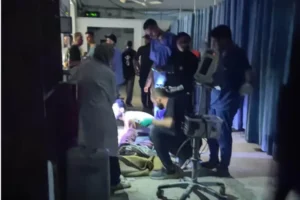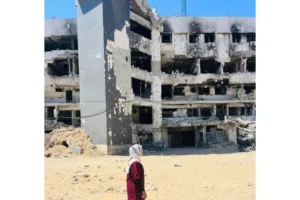Israel wants us to evacuate al-Shifa Hospital again to kill hope

Medical staff at al-Shifa hospital treating a patient under the light of a mobile phone
Hadeel Awad writes in Al Jazeera on 13 September 2025:
When I walk into the emergency ward of al-Shifa Hospital, I feel like I am back in October 2023, when the shocking number of wounded and dead brought in would overwhelm us every day. I see daily dozens of children, elderly, women and men rushed into the hospital with horrific injuries; many would be missing a limb or an eye.
The difference is that back in October 2023, we still had medical supplies and fuel for electricity, we were fully staffed, and all of the hospital wards were still functioning.
Today, al-Shifa is but a shadow of its old self. The medical complex was repeatedly targeted in the genocide, and substantial parts of it were destroyed. With the efforts of hospital staff, the building of the outpatient clinics was restored and turned into the emergency ward; part of the surgery department was transformed into intensive care for bedridden patients. Some doctors and nurses returned to work, but by far not enough. We do not have the necessary medical supplies to tackle the constant inflow of injured patients. Electricity keeps cutting off because of fuel shortages, and we are forced to use saltwater for drinking. The medical staff are exhausted and starved. Earlier this week, I had an 18-hour shift during which all I had to eat was a single can of tuna.
Amid this horror, forced evacuation is looming over the hospital once again. We work in a constant state of fear of what comes next.
The atmosphere is heavy, and faces are tense. Patients look to us, the medical staff, for reassurance, while we try to hide our anxiety and hold ourselves together.

The author in front of a destroyed building at al-Shifa Medical Complex
It is difficult to make any preparations for departure, given that we have received no clear information and no instructions about where to relocate. We don’t have enough vehicles to transport the large number of bedridden patients, some of whom are in critical condition, breathing on ventilators, and could die if moved. We have been given no guarantees that if we were to depart, we would be safe along the way.
We are still trying to make some basic preparations: medical files are being sorted, and lists of transport priorities are being compiled. But these activities are only deepening our despair. Nothing is more difficult than being forced to leave, not knowing where you would go … or how.
Then there is the question of what happens to the communities we serve after we leave.
Al-Shifa remains a vital lifeline for healthcare in Gaza and a last resort for thousands of sick and injured people.
